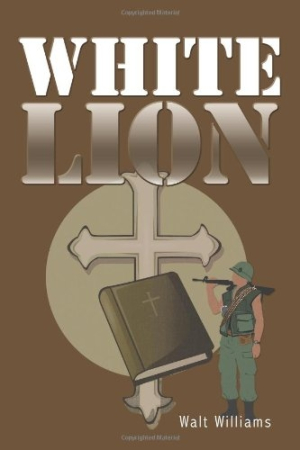White Lion
“One day I tried to add up how many people I killed,” muses the main character in Walt Williams’s White Lion, an intense and exciting story of a Vietnam War scout-sniper turned mercenary who eventually finds peace as an evangelical missionary. “I couldn’t remember them all. As near as I could figure it must have been around 200.”
White Lion is advertised as a work of fiction, although nowhere in the book or on its front or back cover does it say so. It is organized and developed as if it were a war memoir, and it’s one helluva war memoir at that. It’s written in the first person and in a style so crisp, so honest, and so intense that readers will likely forget that it is a novel.
Williams wastes as few pages as possible setting up the backstory of his character, whose name is never revealed (other than being called by his nickname of “Dirt” or “Dirt Hog”), and jumps right into his being drafted and put through training as a member of an Army scout-sniper team. Even that obligatory training sequence is kept sparse and tight so that Williams can propel his subject into the thick of the fighting in the jungles of Vietnam.
White Lion focuses on small groups of men hunting Viet Cong guerrillas and North Vietnamese army officers on quiet, often clandestine expeditions behind enemy lines. The first-person narrative makes the reader not only feel the heat and hear the noise but also almost smell and taste the jungle and the battles being waged in what is a simultaneously lush and rotting theater of war.
Fully half of the slim book is devoted to Vietnam, and most of that half is about men in combat. There are the obligatory R & R scenes, but Williams uses them as brief pauses to allow his combatants—and his readers—to catch their breath before going back into battle.
When the hero, now wounded, returns home, he faces many of the same problems that any veteran of any war faces. Dirt has trouble fitting into civilian life, and he eventually gets sucked back into the killing game—this time for a mercenary outfit that sends him to Latin America, Cambodia, and Rhodesia, where he plies his trade until he finally cannot take it any longer. While these sequences lack the intensity and descriptiveness of the earlier battle scenes in Vietnam, and they are a bit contrived and rushed, they keep the reader turning the pages just to see what happens next.
Dirt eventually comes home, and while a lesser writer would likely have made the antagonist’s “come to Jesus” moment sappy, Williams again shows the restraint and discipline that make his hero’s epiphany seem believable and consistent with his character.
Reviewed by
Mark McLaughlin
Disclosure: This article is not an endorsement, but a review. The publisher of this book provided free copies of the book and paid a small fee to have their book reviewed by a professional reviewer. Foreword Reviews and Clarion Reviews make no guarantee that the publisher will receive a positive review. Foreword Magazine, Inc. is disclosing this in accordance with the Federal Trade Commission’s 16 CFR, Part 255.

